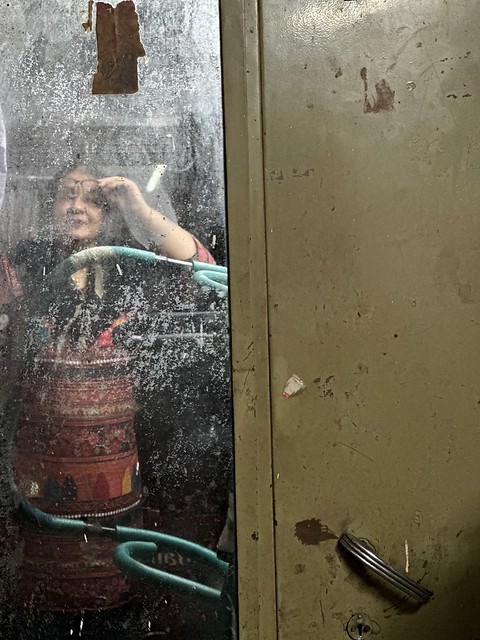
Mission Delhi – Iffat Zarrin, Gali Hakimji Wali

One of the one percent in 13 million.
[Text and photo by Mayank Austen Soofi]
She is “tanha.” Alone. “I try to look for solitude in my tanhai,” murmurs Iffat Zarrin. As patriarchal Old Delhi’s only published women poet, her accomplishments were earned the harder way. For “you can be a shayar only if you are bebaak (outspoken), khwabida (dreamy) and junooni (passionate),” she notes matter-of-factly.
Early this month Iffat Zarrin was promoted to a professor’s rank in Delhi University’s Mata Sundri College for Women, where she started as an assistant professor in Urdu literature in 2006. The new honour hasn’t altered her routines. At night, she continues to keep a diary and a pen under the pillow. “Often while sleeping a line flashes through me like a bijli (lightning).” She then immediately turns on her mobile phone torch to jot down the line in the diary.
This afternoon, Iffat Zarrin is at her beautifully silent home in Gali Hakimji Wali, sitting beside her husband, a dementia patient. “I miss our old days of emotional togetherness.” She also misses her friend Dr Nasreen Raees Khan, who taught Urdu at Satyavati College, and who died in the second wave of Covid. “I’m somewhat alone.” She however feels grateful to the friendship of Sanskrit scholar Dr Ashra Rani, her retired colleague.
Since her two daughters live elsewhere, Iffat Zarrin’s “tanha” evenings are spent coursing through several poetry groups on WhatsApp, or in the books of her most beloved poets—“Mir from the purana daur (old era), Faiz and Nasir Kazmi from the naya daur (new era).”
Naturally the professor has an encyclopaedic grip on the poetry of Mushir Jhinjhanvi, her late father. Recalling the girlhood days at her parental home in nearby Chitli Qabar Chowk, she talks of the soirées in “papa’s baithak” where “while serving chai, I would hear poets Khumar Barabankvi, Shamim Karhani, Hayat Lakhnawi, Shamim Jaipuri, Sahir Hoshiyarpuri, Muzaffar Razmi, Tamanna Jamali recite the ghazalein they composed as recently as that day itself.”
As a homage to the poet-father’s defining role in her creative life, Iffat Zarrin took over the exhausting responsibility of publishing his kulliyat (complete work) , which came out in 2016. These days she is in the process of self-publishing her fifth poetry collection. The professor explains that while it is next to impossible for most contemporary Urdu poets to find publishers, she is determined to have all her poems printed in the book-form. She gifts most of these copies to scholars and friends. “Long after my death, may be some people somewhere will discover my books, a few might even leaf through the pages, reading randomly here and there.” This way her poetry shall survive, she feels.
The poet-professor now abruptly breaks into lines of her own:
“Dilo ke zakhm dhona chahti hoon,
Teri aankhon se rona chahti hoon,
Ye jungle-raat mein tanha akeli,
Sitaro, mein ab sona chahti hoon.
(I want to wash the wounds of these hearts,
I want to shed tears through your eyes,
Utterly alone in this wilderness of the night,
I now want to sleep under these stars.)”
[This is the 556th portrait of Mission Delhi project]
Poet in solitude
1.
2.
3.




Recent Comments